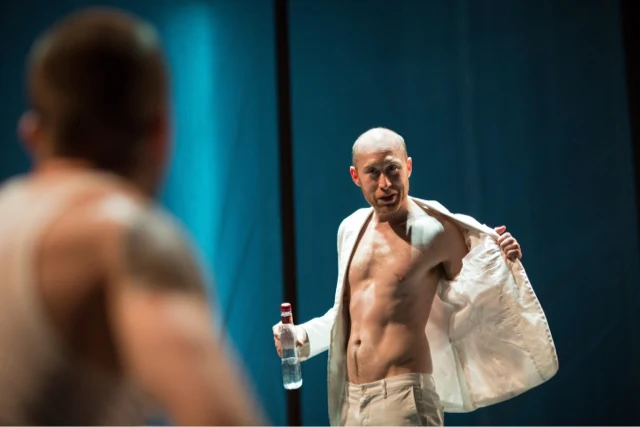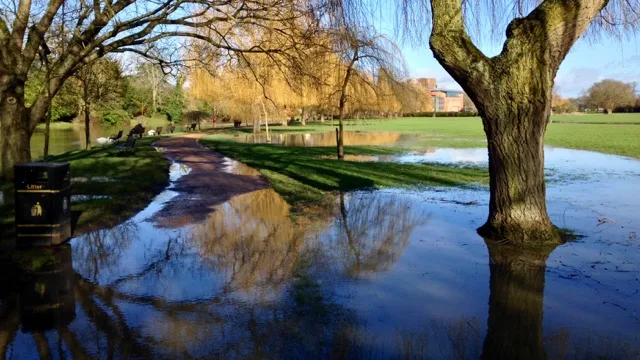Oliver Ryan (Doctor Faustus) and Sandy Grierson (Mephistophilis) – photo by Helen Maybanks/RSC
I have no idea how to even
begin to describe what I have just seen – the RSC’s new production of Christopher Marlowe’s
Doctor Faustus, at the Swan – except to say that it is the very definition of theatre; it is utterly remarkable (and could, I think, only have been directed by the amazing Maria Aberg); it features two actors at the very top of their joint game; is engrossing from start to finish; and left me wandering the dark streets of Stratford-upon-Avon feeling as if I had been scoured thoroughly from the inside to within a millimetre of my flesh. I was, quite literally, stunned. (Even if you
hated it – as I suspect some will… – I doubt if you could say that it lacked significance, or power; that its reverberations did not stay with you for a long time afterwards….)
It therefore took a massive amount of effort to prise my shell from my front-row seat (eyeball-to-eyeball with the intensity of it all); and it was only the knowledge that I will be seeing it three more times (which may not be quite enough…) that motivated me, eventually, to walk away from the RSC; from darkness towards the light….
So, whilst I rebuild myself, molecule by molecule, let me try, at least, to explain why I was there in the first place….
¶
If there is one character I genuinely relate to (even
identify with) in
Shakespeare’s plays – and there
is, of course (and no, it is
not Holofernes, thank you very much…) – it is “good Monsieur Melancholy”,
Jaques. (I am not witty enough to be
Touchstone; nor phlegmatic and grounded enough to be
Corin.)
Jaques is… a man who affects melancholy and whose name sounds the same as another word for ‘chamberpot’. He seeks out excuses for his melancholic outlook, whether it be asking for more depressing music or looking at a wounded deer…. Affected though it may be, and proud of it though he may be, his melancholy takes a serious turn at the end of the play when he chooses not to join in the revelling companions’ restoration to their fortunes, voluntarily excluding himself from happiness….
One of the main reasons I so empathize with Jaques is that I have always found him to be a little
misunderstood (and not just amongst his compatriots): especially – like so many rôles that bear the burden of some of Bill’s best-known lines – as his sudden transformation from the Forest of Arden’s
genius loci – its conscience – to great speech-maker, can seem forced. However, the RSC’s breathtaking 2013 production of
As You Like It – directed by Aberg (now
there’s a coincidence!) – featured Oliver Ryan as Jaques: and, as much as I fell in love with the rest of the supreme cast (so easily done), it was
his thoughtful, seemingly impromptu, poignant, but-well-isn’t-it really-outstandingly-obvious-to-someone-like-me, quasi-conversational response (and with that beautiful Welsh lilt), which set my heart on fire (and every single one of the three times I witnessed it).
Duke Senior
Thou seest we are not all alone unhappy:
This wide and universal theatre
Presents more woeful pageants than the scene
Wherein we play in.
Jaques
All the world’s a stage,
And all the men and women merely players…
There was no declaiming; no grandstanding – this was simply one man’s chance to synthesize his
philosophy, unimpeded; gaining in confidence; understanding that he could – had been
invited to – be listened to (and, for once, not mocked for his unconventional
introversion). The narrative arc, built so subtly, describing, interrogating his own life; pondering on the perils of old Adam’s age, perhaps; considering the challenges of Everyman… was musical and heartfelt. It was a gentle exposition; a compassionate release. Each night, therefore, it engraved itself upon my soul. Not only was Ryan’s Jaques the perfect essence of flawed, faithful humanity; he became the still, small voice of pathos around which the action whirled and twirled to its conclusion. It was almost as if his absence (and he has nearly a tenth of the play’s lines) would have rendered the resultant joy of the other characters meaningless – the contrast of emotion was
essential as a foundation on which exultancy was built.
Oliver Ryan (Doctor Faustus/Mephistophilis) and Sandy Grierson (Doctor Faustus/Mephistophilis) – photo by Helen Maybanks/RSC
Imagine my delight, then, to discover that Ryan would be returning to the RSC, this season: alternating the lead parts (with Sandy Grierson) of Faustus and Mephistophilis in
Doctor Faustus. More
Marlowe! More
Aberg! More
Ryan! (In fact, I am struggling, at the moment, to think of a play more suited to his talents.)
So I immediately booked tickets to those four performances – commencing with yesterday’s Press Night – hoping to see him in both rôles. However…
The way the two actors will decide which character they will undertake will be by both lighting a match at the start of the show on stage. With the one burning out the quickest always taking the same role [Faustus]. Therefore we will be unable to tell you which actor will play the role until the show has begun.
So you may get two shows the same or may get a change depending on luck….
Something a bit different for the RSC….
– Natalie King, House Manager, Royal Shakespeare Company [personal correspondence]
The lady sat next to me had seen Grierson play Faustus twice, already – and this was to be her last visit. I, also, (obviously) wished to see Ryan’s interpretation first. Neither of us, therefore, breathed, or trembled eyelids, for the first couple of minutes – it seemed an eternity… – until all that was left was the flicker of orange flame on Grierson’s face, contrasted with the smoke already curling from Ryan’s hand.
Until that moment, they had appeared as twins; broken-mirrored mimics; one soul indivisible. But this was the cue for Ryan to dig deep into one of the most immersive, destructive, obsessive, mobile, performances I have ever witnessed. This was something new (to me, anyway). Whoever inhabits this tortured rôle of Doctor John Faustus must undergo physical and emotional torment of the most savage kind – and Ryan never once waned. (In fact, at one point, he visibly grew – the veins and muscles of his arms, neck and torso steadily bulging: increasing an already almighty stage presence.)
That is not to say that Grierson had it easy. His ironic, deceptive, treacherous, cheeky Mephistopholis was a masterclass in understatement and manipulative wit. As much as I was taken with Ryan’s portrayal, I am now praying that I will witness the volte-face at least once (and hopefully next time – when I will write in more detail).
¶
As much as I love Shakespeare, I find reading – as well as obviously watching – Marlowe irresistible, engrossing, and utterly poetic. His language flows from the page; and his short span (only 29 years) always saddens me. If these – Tamburlaine the Great, Doctor Faustus, and The Jew of Malta – were his ‘early’ works: what potential greatness have we so tragically been deprived of?
It could be said that Aberg takes great liberties with his text (two versions of which are extant): but, in removing unnecessary diversions, I believe she has produced a storyline that not only flows more cohesively, but is as tight and focused as a laser. If the opening, entrancing scene lasted aeons; the next hundred minutes flew by – with wonderful, punchy, changes of pace and pathos. (There is no interval.)
To be honest, I am not utterly certain (repeated viewings, I am sure, will help…) that every idea succeeds. But the overwhelming result is tremendously triumphant (albeit as tragedy) – and reminds us, constantly (and coherently) that, as Mephistophilis says very early on, “Why, this is hell, nor am I out of it.” Although Nicholas Lumley’s deeply thoughtful and caring Wagner frames Faustus’ transgression from frustrated reality to ambivalent sovereignty, from distrustful faith to growing doubt, it never marks any escape from earthbound Erebus for either audience or players.
Sandy Grierson (Mephistophilis), centre; with company – photo by Helen Maybanks/RSC
There are moments of extended, balletic beauty – Mephistophilis’ mouthing of Faustus’ “Was this the face that launched a thousand ships…”, in particular, a thing of crystal, sorrowful, grief-stricken perfection. There are also instances of (almost Rocky Horror Show-style) travesty. But I never once suspected gimmickry; nor deviation from a single-minded narrative view.
Additionally, the music – by Orlando Gough – is integral to the production; as is Ayse Tashkiran’s choreography. (I do feel sorry for the techs, though, having to ‘recreate’ the pristine design – by Naomi Dawson – each time. This is not a show that pulls punches in any department; in any direction. Not only was I wrecked; but so was the stage.)
Oliver Ryan (Doctor Faustus) – photo by Helen Maybanks/RSC
Coming full circle, then… – I recently explained to someone how I cope with my deafness and disability:
Admittedly, with the [reward] comes punishment. I will be knackered – emotionally and physically – for days, sometimes, weeks, after the effort made to go out – to walk, to listen [at a concert], to see a play. But I refuse to be either defined or limited by what other people – or my body – expect me to be capable of! (And I am more than willing, now, to pay the price.)
I can therefore, now, (on a micro level) also identify with (Marlowe’s and Ryan’s) Faustus. Sometimes, the temptation – maybe not for instant gratification; but certainly for pleasure (for the power) to relieve, to distract from, a life of pain, a life of uncertainty… – is just too great.
























